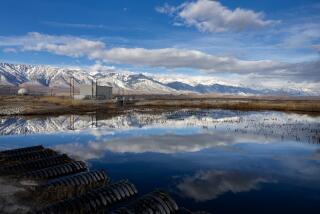Water Conservation Citations in Camarillo Rise
- Share via
The end of the drought has apparently diluted Camarillo residents’ concern over water conservation, according to city officials.
In April, the city issued 74 citations to residents who violated the city’s water conservation laws, three times the average of 25 to 30 citations during the previous five months, officials said.
“A lot of people are leaving the sprinklers on so long that they have water running down the streets one or two blocks,” Tony Kack, water conservation officer, said. “People are washing their cars and they throw the hose down on the driveway and let it run.”
Both offenses--letting water run off property or using a hose without an automatic shut-off device--are illegal under the water conservation ordinances adopted by the Camarillo City Council during the height of the drought in April, 1991.
“A lot of it is people thinking the drought is over,” Kack said. “When they saw that headline they assumed all the ordinances were dropped, which they weren’t.”
In addition to the restrictions on water runoff and open hoses, the ordinances ban the washing of patios, driveways and sidewalks; prohibits lawn watering between 8 a.m. and 6 p.m., and requires that restaurants serve their patrons glasses of water only upon request.
The first citation for violating the ordinances is only a warning, while the second carries a fine equal to 50% of a customer’s water bill, which usually amounts to a penalty of about $10.
Although this year’s heavy rains heralded the end of the seven-year drought, Camarillo officials said they intend to keep the conservation laws in place, with the goal of holding water use down to 10% below the 1989-90 fiscal year.
“Why would you want to let people waste water whether the drought is over or not?,” Community Services Director John Elwell said. “Conservation’s always going to be a way of life for us. There’s simply not enough water to go around for everyone to indiscriminately use it.”
Some other cities, such as Ventura, took a different tactic during the drought, imposing water rationing without restricting how residents may use--or waste--their water allocation.
“If they wanted to grow roses and take less showers, that was the choice they could make,” said Henry Graumlich, administrative assistant to the Ventura director of public works.
Ventura has now lifted its water rationing, though the city has maintained the water conservation ordinances established before the drought.
In contrast to Camarillo, however, Ventura city officials use their conservation regulations more as guidelines than as hard-and-fast rules, Graumlich said.
Although Ventura water workers have the power to issue citations to residents caught wasting water, such as running open hoses, they generally just talk to the people and try to educate them on conservation, he said.
Ventura may enforce water conservation less stringently than Camarillo, but Ventura has access to more water, officials in both cities said.
While Ventura can tap ground water, the Ventura River and Lake Casitas, Camarillo gets half of its water from wells and depends upon the Metropolitan Water District--which scaled back its water allocations during the drought--for the other half.
Camarillo City Manager J. William Little said residents should regard a prolonged drought as an incentive toward conserving water.
“I don’t think any of us who lived here during the last three or four years, unless they’ve been totally unconscious, could say it can’t happen again,” Little said. “The rains we’ve had may be just a break in a long-term cycle.”
More to Read
Sign up for Essential California
The most important California stories and recommendations in your inbox every morning.
You may occasionally receive promotional content from the Los Angeles Times.













